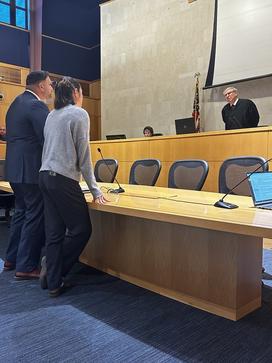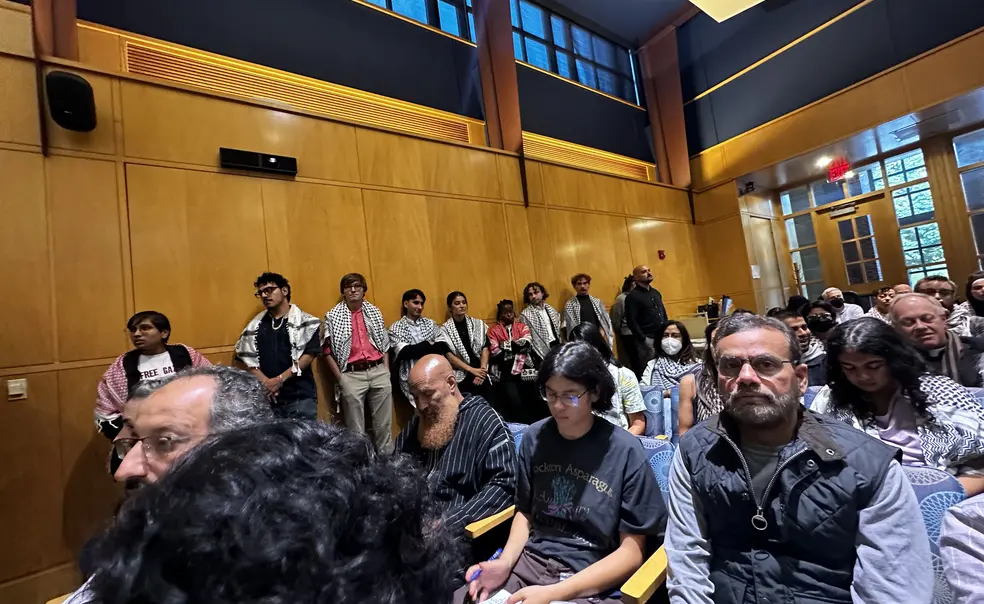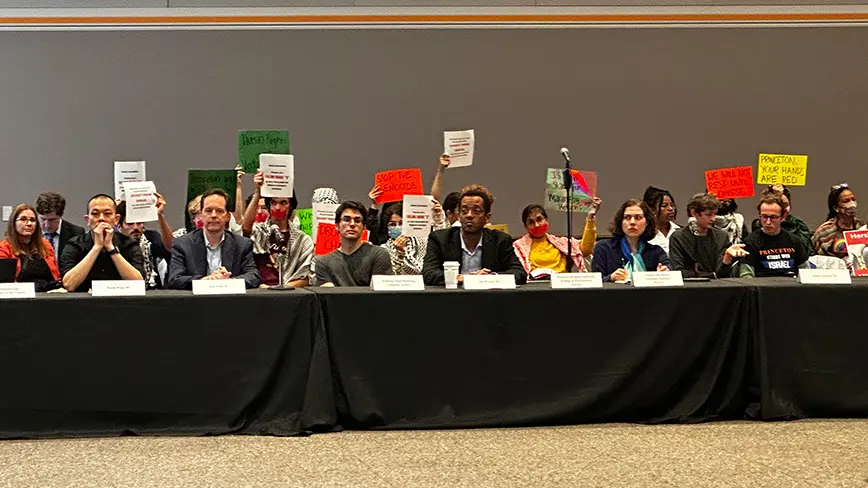Judge Denies Plea Deal to Clio Hall Protesters
‘I’m not accepting this plea agreement. It’s not in the interest of justice,’ Judge John McCarthy III ’69 said
The two pro-Palestinian protesters who were arrested on Princeton’s campus for attempting to set up tents in the spring pleaded guilty and received suspended fines on Oct. 1, but Judge John McCarthy III ’69 denied the same deal to the first of the Clio Hall occupiers appearing in Princeton Municipal Court.

Achinthya Sivalingam *24 and Hassan Sayed, a graduate student in economics, appeared in person to accept an agreement from prosecutor Christopher Koutsouris to plead guilty to a municipal noise ordinance, rather than defiant trespassing as originally charged. McCarthy accepted the deal and suspended their $100 fines, though both had to pay $33 in court costs.
Prior to the judgement, Omar Qadeer, the lawyer representing Sivalingam and Sayed, said that it wasn’t clear at the time of arrest that the two were breaking the law, and that his clients wanted to resolve the matter and move on with their lives.
The judge then turned to the 13 defendants who were arrested on April 29 following the occupation of Clio Hall, 10 of whom appeared in person while the other three were on Zoom.
Aymen Aboushi, the defendants’ lawyer, said six of his clients wanted to accept the same plea deal that Sivalingam and Sayed received. McCarthy responded by calling on Sara Ryave ’24 to testify under oath about her role in the Clio Hall takeover.
She said she entered the building with the intention of talking to Rod Priestley, dean of the graduate school, who was not present, about divestment from Israel. She said that someone in the group — though she couldn’t recall who — asked staff to leave, but wavered on whether there was a 60-second countdown, as reported by PAW in June.
“I do believe that one of us did ask, tell them, that ... they had a certain amount of time to leave,” Ryave said, adding that the only staff member in the office they occupied finished an email and left before protesters barricaded the doorway with furniture. She did not recall being told that they were trespassing, stating that she was primarily in the back of the room looking out a window. She did admit to making loud noises.
In response to questions about how the Clio Hall plan was formed and who was behind it, Ryave said there wasn’t a formal group or leader.
The judge, who said several times that all plea deals needed to be based in fact and in the interest of justice, denied the deal, stating that the noise ordinance charge was not appropriate given the circumstances. While commending Aboushi’s clients’ strength, courage, and conviction, McCarthy said there needs to be responsibility and those who pitched tents outside should not receive the same deal as those who issued a countdown to staff while occupying a building.
“I’m not accepting this plea agreement. It’s not in the interest of justice,” McCarthy said, urging the parties to give the matter more thought. The court then adjourned. The next hearing is set for Nov. 5. A LinkedIn profile that appeared to be Ryave’s showed she is currently pursuing a certificate from Princeton’s Teacher Preparation Program in social studies and a teaching licensure from the state.
In the spring, the University announced that those arrested were unlikely to face penalties greater than probation in the campus disciplinary system. Princeton Israeli Apartheid Divest (PIAD) posted on X, formerly Twitter, that those arrested were given four years of disciplinary probation by the University; the University declined to comment on disciplinary action.











2 Responses
Jerome P. Coleman ’70
1 Year AgoSupport for Judge’s View on Plea Deal
The judge is an accomplished jurist. The deal presented to him by the prosecutor is a disgrace. One cannot occupy a building and stop work and expect a tap on the wrist. Such nonsense derides justice and encourages further lawlessness.
James J. Stewart ’58
1 Year AgoJudge’s Plea Decision
I agree with the judge. I believe the accused broke the law by entering the building.